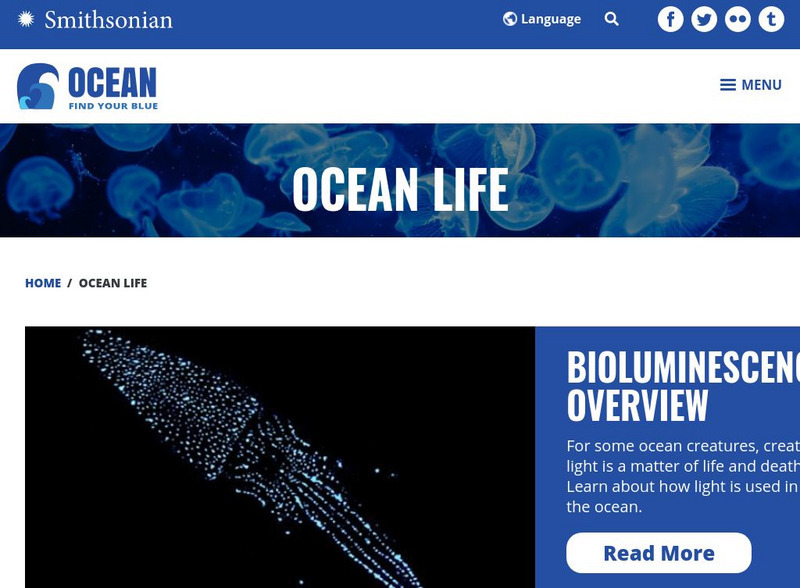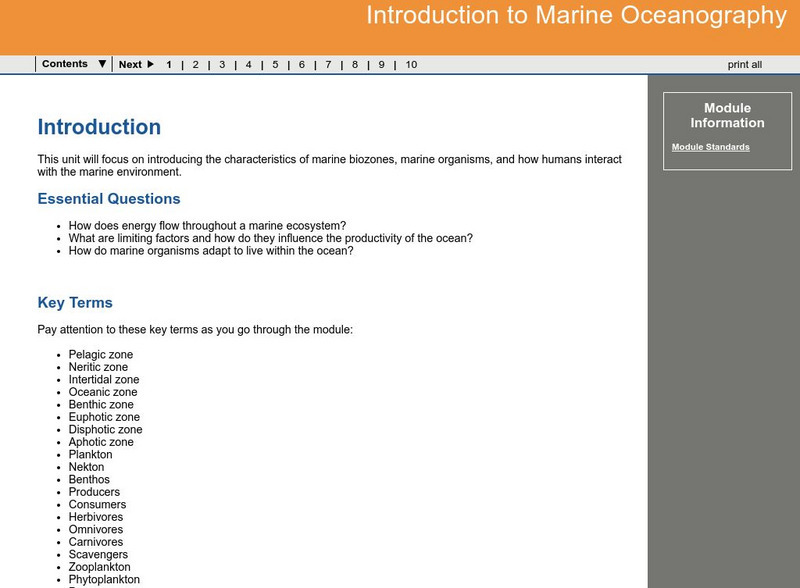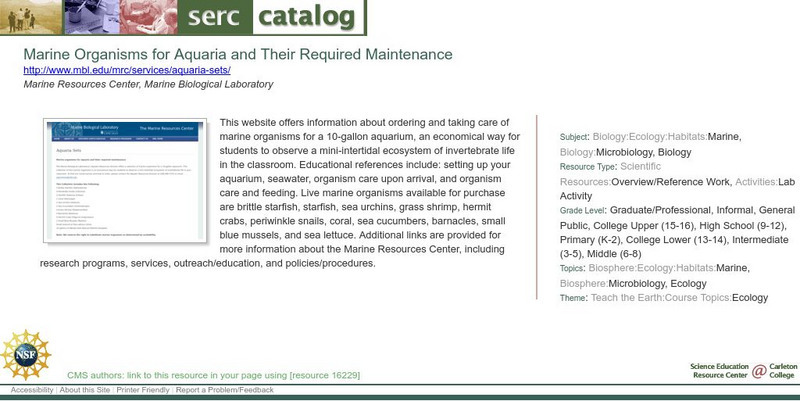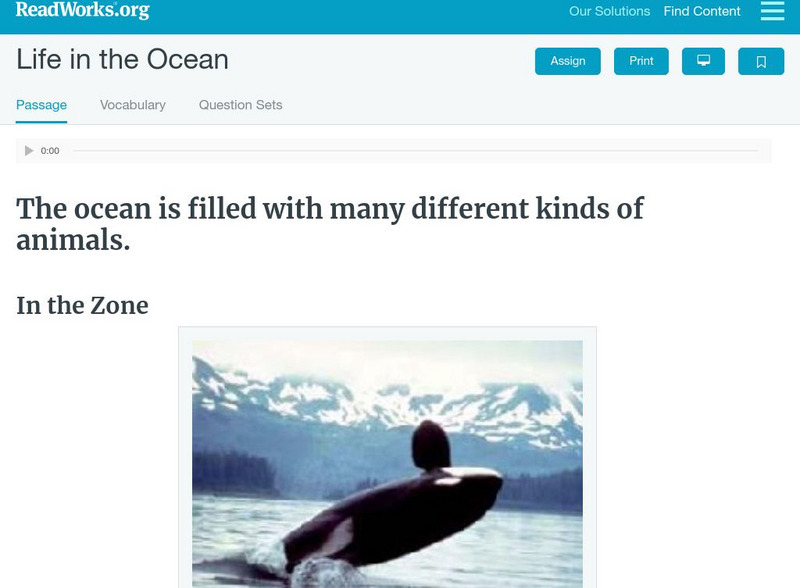Hi, what do you want to do?
Smithsonian Institution
National Museum of Natural History: Ocean Portal: Ocean Life & Ecosystems
From the tiny to the titanic, from the familiar to the undiscovered, the ocean offers a stunning diversity of marine life and nearly every kind of habitat imaginable. Dive in and explore them here. Links incude stories, videos and photos...
American Museum of Natural History
American Museum of Natural History: Milstein Hall of Ocean Life
Tour the museum's famed exhibition hall dedicated to ocean life at this online recreation. Find videos, maps, species specimens, and images that let you experience many of the museum's resources on ocean life right from your desktop.
American Museum of Natural History
American Museum of Natural History: O Logy: Marine Biology: The Living Oceans
This resource is a place for exploring, asking questions, finding information, meeting scientists, and learning about marine ecosystems.
DOGO Media
Dogo News: Tiny Sea Animals May Drive Sea Currents
New research suggests that very tiny sea creatures in very huge numbers may contribute to the movement of the oceans' currents. Debate and more research are still necessary to prove this. Includes video.
Scholastic
Scholastic: Ocean Life
Good starting point for researching ocean life. Find general information, research-topic ideas, a glossary of important terms and people, and numerous links to related sites.
Georgia Department of Education
Ga Virtual Learning: Introduction to Marine Oceanography
Students learn about marine biozones, marine organisms, and how humans interact with the marine environment.
American Museum of Natural History
American Museum of Natural History: O Logy: Marine Biology
Learn about marine biology, life in the ocean. It defines marine biology and provides links to games, stories, videos, and hands-on activities on the topic.
NOAA
Noaa: Ship Okeanos Explorer: "America's Ship for Ocean Exploration"
Follow teams of scientists as they explore marine life and habitats of the deep ocean. Covers past and current expeditions in various regions of the world. Includes webcasts, videos, lesson plans and modules, and career resources. An...
NOAA
Noaa: Living Ocean Gallery Invertebrates
Many still photographs and video clips of marine invertebrates are available in this huge collection.
Georgia Department of Education
Ga Virtual Learning: Marine Invertebrates
Students learn about invertebrates found in the ocean, their individual methods of adaptations, identifying characteristics, and contributions to the marine ecosystem.
Georgia Department of Education
Ga Virtual Learning: Marine Vertebrates
Learn about vertebrates found in the ocean, their individual methods of adaptations, identifying characteristics and contributions to the marine ecosystem.
Science Education Resource Center at Carleton College
Serc: Inquiry Into High Resolution Ice Core and Marine Sediment Records
Activity in which questions are provided relating to interpreting paleoclimate data such as characteristics that make sites favorable for paleoclimate records, locating sites using a map, finding patterns and correlations in the data,...
Smithsonian Institution
National Museum of Natural History: Ocean Portal, You Navigate
Delight in the fresh colors, sights, and sounds on this dynamic site on the ocean. Major categories consist of Ocean Life & Ecosystems, The Ocean Over Time, Ocean Science, and The Ocean and You. New information on sharks, a slideshow...
PBS
Pbs.org: Splash & Bubbles: Marine Biology & Social Emotional Learning for Your Classroom
Through play and exploration, Splash and Bubbles demonstrates and celebrates the amazing diversity of life in the ocean, building awareness and appreciation among its young viewers. All the while, viewers are exposed to concepts of...
Read Works
Read Works: Marine Biology
[Free Registration/Login Required] A literary text about a boy named Frank who grew up loving the ocean and has dreams of becoming a marine biologist. A question sheet is available to help students build skills in reading comprehension.
Careers New Zealand
Kiwi Careers: Marine Biologist
This KiwiCareers site provides information regarding tasks and duties, working conditions, and other career related information for marine biologists.
The Franklin Institute
Treasures@sea: Exploring the Ocean Through Literature
This extensive resource consists of learning activities that integrate language arts with oceanography. Each activity is based on one of seven books about the ocean and are written to be adaptable. Includes writing activities, games and...
American Museum of Natural History
American Museum of Natural History: O Logy: What's the Big Idea? Marine Biology
An introduction to key concepts about the ocean, its ecosystems, and zones. With interactive flash cards that open in new windows to help you learn more.
TED Talks
Ted: Ted Ed: Deep Ocean Mysteries and Wonders
Marine biologist, David Gallo, shows why oceans are important while taking the viewer on a voyage into the ocean and exploring the incredible beauty of marine life. [8:24]
NOAA
Noaa: Ocean Facts on Marine Fish Habitats
The depletion of marine fish habitats from NOAA affects more than just the fish - it can affect you too! Learn facts about the importance of habitat preservation for science, and for people like you.
Science Education Resource Center at Carleton College
Serc: Marine Organisms for Aquaria and Their Required Maintenance
What can you do with an ocean animal aquarium in your classroom? This website offers information about ordering, setting up, and taking care of marine organisms for a 10-gallon aquarium which is a great way for students to observe a...
NOAA
Noaa: Ocean Facts on Marine Mammals
The National Oceanic & Atmospheric Administration sponsors this introductory article and related links that tell why marine mammals are valued by the public for their great aesthetic, recreational and economic significance.
Read Works
Read Works: Life in the Ocean
[Free Registration/Login Required] An informational text about the different depth levels of the ocean and the types of animals that live in each. A question sheet is available to help students build skills in reading comprehension.
Other
Ocean Tracks: Fact or Artifact? Interpreting Patterns in Ocean Tracks Data [Pdf]
Ever wonder where marine animals go? How fast they swim? How deep they dive? Electronic tagging has opened a new window into the world of the open ocean. Ocean Tracks gives you access to data collected by tags on real live migrating...























